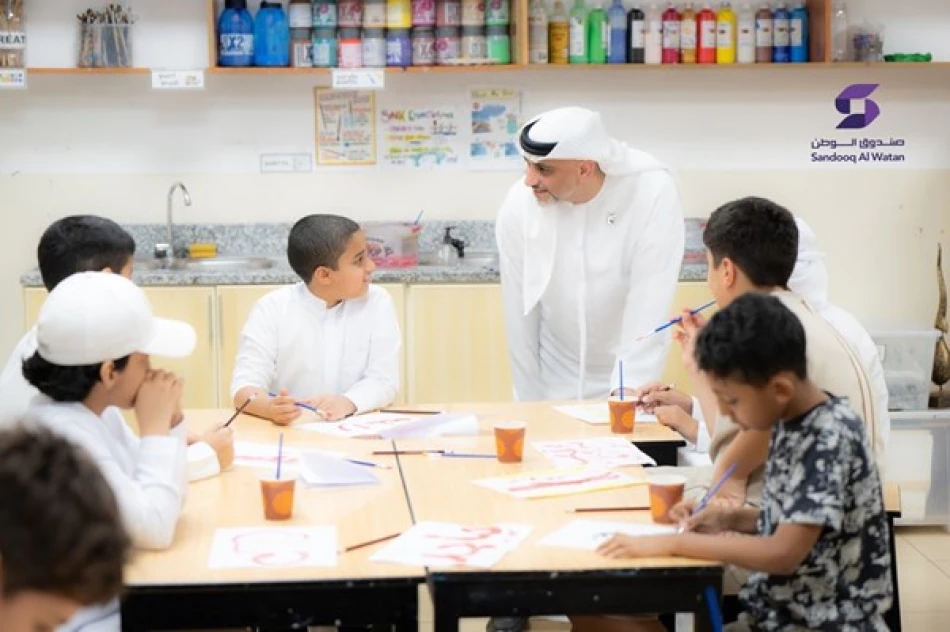
Summer Programs by Homeland Fund Attract Overwhelming Participation in Third Week
UAE's Al-Watan Fund Summer Programs Draw Thousands as Cultural Identity Takes Center Stage
The UAE's Al-Watan Fund has captured significant attention with its ambitious summer programs spanning 56 locations nationwide, marking a strategic shift toward strengthening Emirati cultural identity among young people. Now in its third week, the initiative has drawn massive participation from both public and private school students, signaling a growing emphasis on heritage preservation in the face of rapid globalization.
A New Model for Youth Engagement
The programs represent a departure from conventional summer activities, focusing intensively on Emirati identity, Arabic language mastery, and cultural heritage spanning all UAE environments. This approach reflects broader regional trends where Gulf nations are investing heavily in cultural preservation as economic diversification accelerates.
The initiative targets three distinct age groups—8-10 years, 11-13 years, and 14-16 years—with curriculum designed to engage each demographic appropriately. Parents and students have particularly praised activities centered on "Arabic as the language of the Quran," which strengthens both linguistic skills and cultural foundations.
Elite Creative Leadership
The programs benefit from direct involvement of prominent Emirati creatives, artists, and intellectuals, alongside substantial educational staff including supervisors and teachers. This high-caliber leadership suggests serious institutional commitment rather than superficial cultural programming.
Strategic Vision Behind the Initiative
Yasser Al-Qarqawi, Director General of Al-Watan Fund, emphasized that the programs fulfill clear directives from Sheikh Nahyan bin Mubarak Al Nahyan, Minister of Tolerance and Coexistence and Chairman of Al-Watan Fund's Board of Directors. The mandate specifically calls for activities that meet student and parent expectations while delivering national identity values without neglecting artistic, sports, and entertainment elements.
Al-Qarqawi highlighted the programs' unique approach: "The programs presented a different vision for summer activities, ensuring distinguished and simplified educational content that considers all participating age groups and relies on positive interaction from participating students."
Cultural Programming with Modern Appeal
The initiative has successfully captured student attention through theatrical and heritage performances, with Arabic language programs showing particularly strong engagement. This suggests effective adaptation of traditional content for contemporary audiences—a challenge many cultural preservation efforts struggle to overcome.
Traditional Stories, Contemporary Delivery
One standout element involves theatrical performances of classic Arabic literature, including "Kalila and Dimna - The Snake and the Crow," presented by the "Lady of Tales" troupe. Director Nayrouz Mohammed Al-Tanbouli noted that performances also include popular folk tales featuring the beloved character Juha, demonstrating how traditional narratives can maintain relevance for modern audiences.
Al-Tanbouli emphasized the programs' focus on talent encouragement and development, helping participants discover their creative potential while building cultural knowledge through reading and cultural engagement.
Parent and Community Response
Substantial parent feedback indicates the programs successfully balance entertainment with personal development. Parents report that their children's participation has enhanced talents, supported capabilities, and strengthened national identity and human values.
The programs have created what parents describe as a "stimulating environment that combines entertainment and personal development" through workshops, scientific activities, technical programs, and arts, innovation, sports, and entertainment fields.
Broader Implications for Regional Cultural Policy
This initiative reflects a sophisticated understanding of cultural preservation challenges facing rapidly modernizing societies. Unlike top-down cultural mandates that often fail to engage young people, Al-Watan Fund's approach integrates entertainment, education, and identity formation in ways that appear genuinely appealing to participants.
The program's scale—spanning 56 locations with significant creative talent involvement—suggests substantial resource allocation and institutional commitment. This positions the UAE alongside other regional leaders like Saudi Arabia and Qatar in prioritizing cultural identity preservation as a strategic national priority.
The success of these programs may provide a replicable model for other nations seeking to balance rapid modernization with cultural continuity, particularly in regions experiencing significant demographic and economic transformation.
Most Viewed News

 Layla Al Mansoori
Layla Al Mansoori






